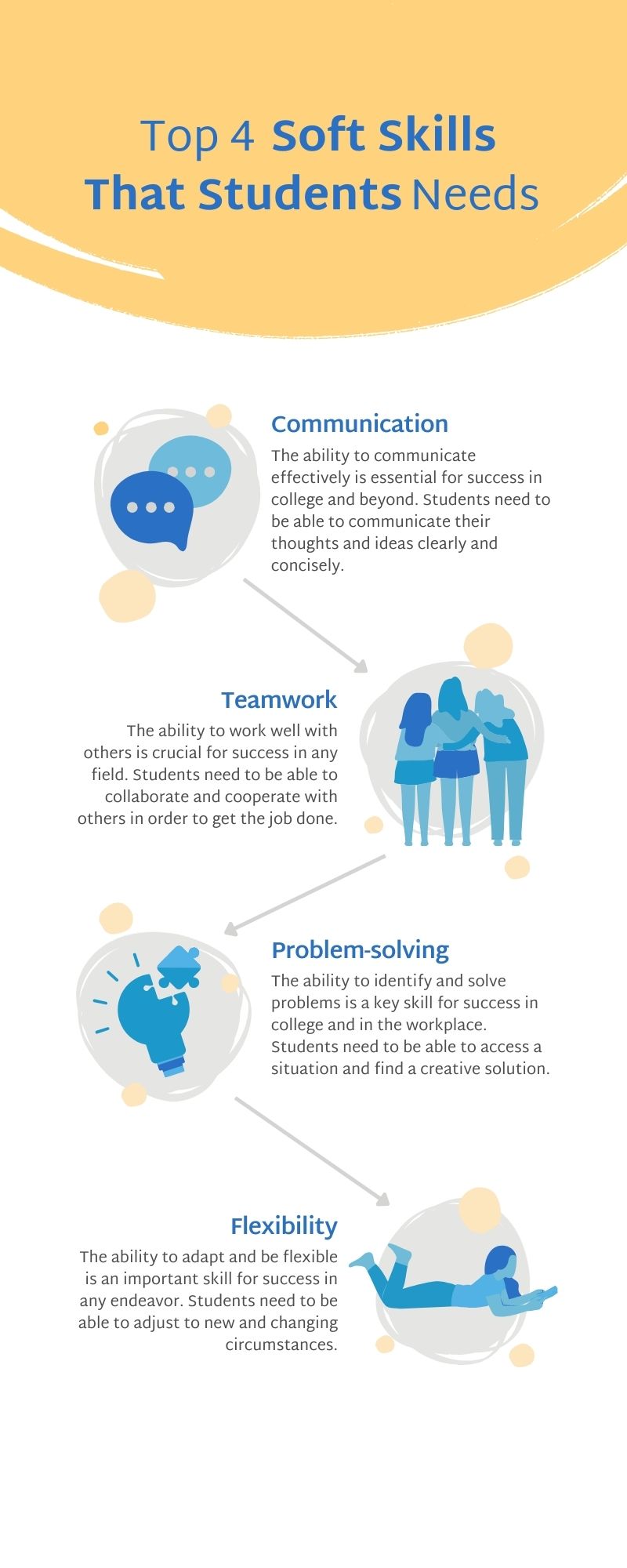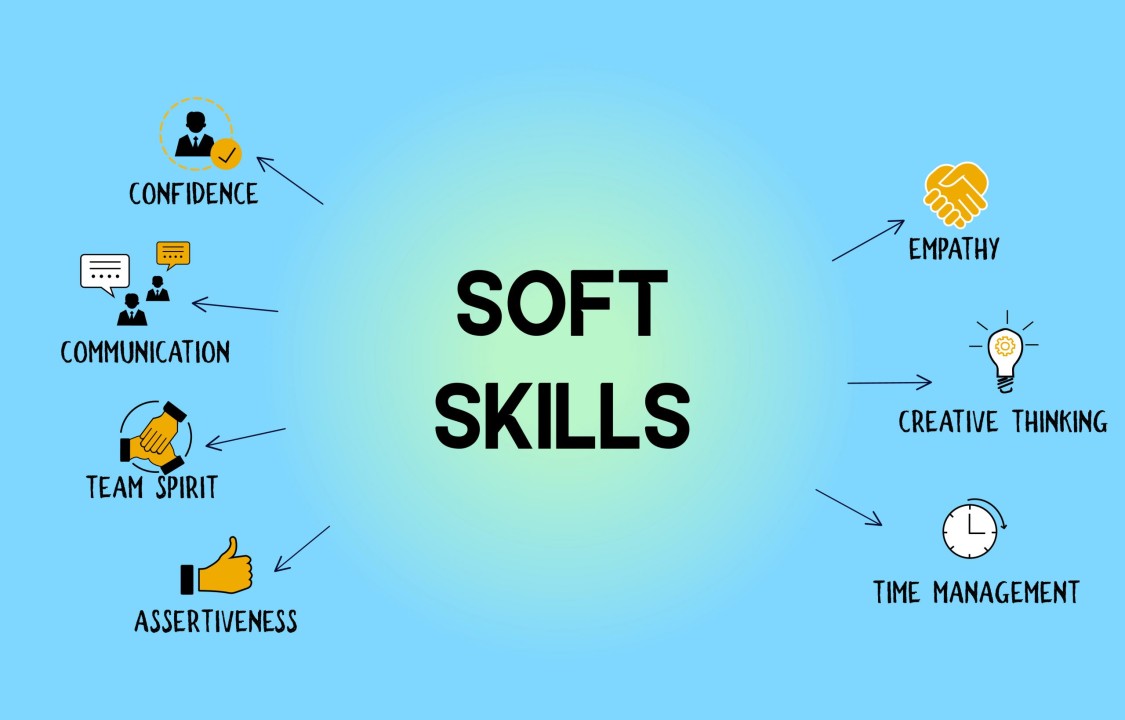To develop soft skills, and practice communication in discussions and debates. Work on understanding emotions for effective management. Improve time management by setting goals and priorities. Take leadership roles in projects or schools to build leadership skills. Collaborate in teams to enhance cooperation and contribution. These skills enhance academic performance, employability, confidence, and relationships. Hands-on activities, feedback, guest speakers, and a supportive learning environment are beneficial for teaching soft skills. Focus on time management, communication, critical thinking, and adaptability. Engage in projects like marketing campaigns or community events. Developing soft skills will set you up for success in both academics and future endeavors.
Must Read: List of 16 Highly Demanding & Must Have Skills for Commerce Students in India
What are soft skills?
Soft skills are the personal attributes and abilities that enable you to work effectively and harmoniously with others. These skills are essential for your success in both academic and professional areas. Communication skills are a vital component of soft skills, encompassing verbal and non-verbal interactions. Being able to express your thoughts clearly and listen actively to others fosters collaboration and understanding.

Examples of Soft Skills
You need to grasp the essence of interpersonal skills, emotional intelligence, communication, teamwork, and adaptability as examples of soft skills. These qualities are crucial for your success in academia and future career endeavors.
Let’s explore each of these skills further to understand how they can benefit you in various aspects of your life.
- Interpersonal Skills
Effective communication is crucial for students to build strong interpersonal skills. Practice active listening with full attention, eye contact, and clarifying questions. Develop empathy to understand different perspectives. Enhance teamwork through group projects and resolve conflicts calmly, focusing on solutions and compromise to foster successful relationships.
- Emotional Intelligence
To boost your interpersonal skills, focus on emotional intelligence. This means understanding your own emotions and those of others to better manage relationships. By improving self-awareness, self-regulation, empathy, and social skills, you’ll communicate more effectively, handle stress, resolve conflicts, and build positive relationships, enhancing your overall soft skills.
- Communication
Enhancing communication skills is crucial for building strong soft skills. It involves active listening, clear speaking, and effectively conveying your thoughts. Improve relationships, academics, and career prospects by expressing ideas confidently, noting non-verbal cues, and adapting to different situations. Embrace feedback and remember communication is a two-way street.
- Teamwork
Improving teamwork skills is crucial for developing soft skills. Teamwork means collaborating effectively toward a common goal. By being a team player, you boost your communication, listening, and compromise skills. In group projects, practice active listening, respect diverse opinions, and contribute constructively. Delegate tasks, leverage each member’s strengths, and work cohesively. Embrace diversity and appreciate each member’s unique skills to foster a positive and collaborative environment, benefiting both academic and professional pursuits.
- Adaptability
Embracing adaptability is key to enhancing your soft skills and succeeding in various situations. Being adaptable means being open to change and quick to adjust. For instance, if a team member drops out of a project, an adaptable student would reorganize tasks to keep the project on track. This flexibility highlights your resilience and problem-solving skills. Adapting easily to different environments shows potential employers and peers that you can thrive in dynamic, ever-changing situations.

Why Do You Need Soft Skills?
Developing soft skills is crucial for success in today’s job market. Employers value candidates with strong communication, teamwork, and problem-solving abilities. These skills help you build good relationships, work well with others, and adapt to changing work demands. Good communication is key to connecting with clients, colleagues, and bosses. Strong soft skills can make you stand out during hiring and help you advance in your career. Investing in these skills equips you to excel and succeed in your field.
Why are soft skills important for students?
Soft skills are crucial for students, forming the foundation for future success in academics and careers. These skills include communication, teamwork, adaptability, problem-solving, and leadership. Developing soft skills enhances academic performance, improves relationships with peers and teachers, and prepares students for the modern workforce.
In a competitive world, strong soft skills help students stand out and excel. Employers value these skills for effective collaboration and innovation. Students with well-developed soft skills are better prepared for job market demands and rewarding careers.
Moreover, soft skills aid in personal growth, helping students navigate social interactions, manage conflicts, and handle stress. Cultivating these skills leads to increased confidence, resilience, and overall well-being, paving the way for a successful future.
.png)
How to improve soft skills for students
Wondering how students can improve their skills for future success? Improving soft skills is crucial for your personal and professional growth. Here are some practical ways to boost these vital abilities:
- Practice Communication: Engage in group discussions, presentations, or debates to enhance your verbal and non-verbal communication skills. Actively listen to others and express your thoughts clearly.
- Develop Emotional Intelligence: Work on understanding and managing your emotions effectively. Practice empathy, adaptability, and conflict resolution to build strong relationships.
- Enhance Time Management: Prioritize tasks, set realistic goals, and create a schedule to manage your time efficiently. This skill will help you meet deadlines and reduce stress.
- Build Leadership Skills: Take on leadership roles in group projects or clubs to develop skills like decision-making, delegation, and motivation.
- Practice Collaboration: Work in teams to improve your ability to cooperate, compromise, and contribute effectively towards shared goals.
Benefits of soft skills training for students
To truly reap the rewards of improving your soft skills, understanding the benefits of dedicated training is essential. Soft skills training for students offers numerous advantages that can positively impact various aspects of your life.
Firstly, honing soft skills like communication and teamwork enhances your academic performance by improving your ability to collaborate with classmates on projects and effectively communicate with teachers. These skills are also highly valued by employers, making you more marketable and increasing your chances of landing a job after graduation.
Additionally, soft skills training boosts your confidence, enabling you to navigate social situations with ease and present yourself professionally. Improved emotional intelligence gained through training helps you manage stress, build stronger relationships, and handle conflicts constructively.
How to teach soft skills to students
Incorporate hands-on activities and real-world scenarios to teach students essential soft skills effectively. Engage them with role-playing exercises, group projects, and simulations to enhance communication, teamwork, and problem-solving abilities. Provide constructive feedback, highlighting strengths and areas for improvement, and encourage self-reflection for better self-awareness.
Invite guest speakers from various industries to share experiences and insights on the importance of soft skills in the workplace. Create a supportive and collaborative learning environment that values open communication, mutual respect, and a positive attitude. This approach motivates students to actively engage in developing their soft skills.
Skills to develop as a student
To become a well-rounded student, focus on developing a diverse set of skills for academic and future career success. Time management is crucial—learn to prioritize tasks, create schedules, and meet deadlines. Effective communication is also essential—express your thoughts clearly, listen actively, and work well in teams.
Critical thinking is key—analyze information, solve problems, and make informed decisions. Lastly, adaptability is vital—embrace change, be open to new ideas, and adjust to different situations. Cultivating these skills will enhance your academic journey and career prospects.
Soft Skills Projects for Students
Engaging in projects can significantly enhance students’ soft skills, aiding both academic and professional success. Here are some effective project ideas:
- Marketing Campaign for a Local Charity: This project fosters collaboration, creativity, and presentation skills.
- Organizing a Community Event: Students practice leadership, organization, and adaptability.
- Research Project on a Social Issue: Encourages critical thinking, research skills, and empathy.
- Designing a Sustainable Solution: Promotes innovation, resilience, and project management skills.
- Debate or Mock Trial: Sharpens the ability to think on their feet, analyze information, and communicate persuasively.
These projects provide practical opportunities for students to apply and refine their communication, teamwork, time management, and problem-solving abilities.
Conclusion
Developing soft skills as a student is essential for success in school and beyond. By honing skills such as communication, teamwork, and problem-solving, you can enhance your academic performance and prepare for future career opportunities.
Actively practice and seek opportunities to improve your soft skills. Participate in engaging projects, collaborate with peers, and embrace challenges. By investing in your personal and professional growth, you’ll set yourself up for success in all aspects of life. Heritage Girls School encourages you to take charge of your development and make the most of every learning opportunity.



